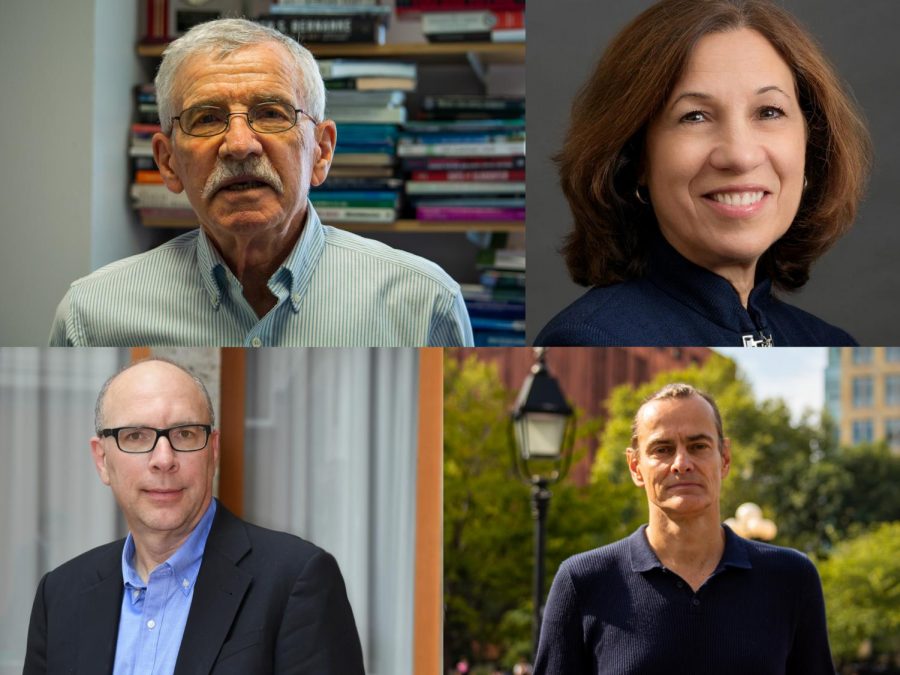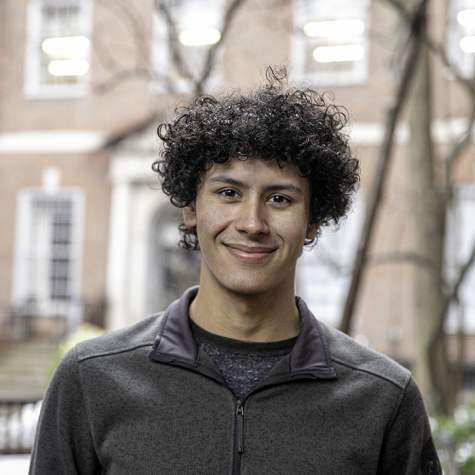NYU faculty recount the Sept. 11 attacks 20 years later
Professors share their personal accounts of the attack on the World Trade Center and offer advice to current NYU students.
Members of NYU’s community witnessed the Sept. 11, 2001 terrorist attacks from different areas of New York City. NYU professors who were in New York City share their personal accounts of Sept. 11, 2001. (Staff Photos by Manasa Gudavalli, Image courtesy of Carol Tosone, Image courtesy of Jay Rosen)
September 11, 2021
Twenty years ago today, the beginning of NYU’s fall 2001 semester was cast into disarray. The university community found itself at the epicenter of a terrorist attack that forever changed the city and campus that thousands of students, faculty and employees call home. Memories of Sept. 11, 2001, continue to haunt NYU faculty who were in New York City on that day.
The morning
Since NYU’s campus is scattered across lower Manhattan, members of the university community witnessed the terrorist attacks from different areas of the city. Regardless of their location, NYU professors vividly recall where they were when the first airplane crashed into the World Trade Center.
Before the attacks, English professor Catharine R. Stimpson said, “it was a beautiful, beautiful day.”
Then Stimpson saw the planes crash into the twin towers on TV.
“The disaster and the death came in the midst of this glorious — once-glorious — day,” she said. “The smell of dust, the smell of death.”
Ulrich Baer, who teaches comparative literature, German and English, was walking along Fifth Avenue with his 1-year-old son when he saw a plane flying fast above Washington Square Park.
“At around 9:30 a.m., people were starting to walk up from downtown, from TriBeCa, and they literally looked like they were out of an apocalyptic movie, covered in ash,” Baer said. “I was in Washington Square Park when the second plane hit, stayed in the park for a while and then went back home.”
While most professors were on campus or nearby during the attacks, not all immediately understood what was happening that morning. Stern professor Lawrence White was preparing to teach a 9 a.m. class when a colleague informed him of the attacks. Nevertheless, White taught the graduate microeconomics lecture. About half of his class was present.
“There was sort of a buzz going on among the students,” White said. “It was serious.”
At 9:45 a.m., Mary Miller, an associate dean at Stern, entered the classroom and said, “Two jet planes have hit the twin towers.” Miller cautioned students to stay in the building and not go outdoors.
White asked to speak with Miller privately. She instructed him to not cancel his 10:30 a.m. class. White noticed an even lower turnout than at his previous class.
The aftermath
Following the attacks, six of NYU’s residence halls within a 20-block radius of the towers’ collapse were evacuated. Students were initially escorted to the Coles Sports Center, then later placed in midtown Manhattan hotels. WSN writers Bill Lucia and Matt Murphy reported on the dorm evacuations on Sept. 12.
“There were 40 to 50 student volunteers at Coles,” Lucia and Murphy wrote. “There were a number of faculty volunteers from each of the NYU schools.”
Many professors, including Stimpson, signed up to provide support to the NYU community. Stimpson remembers volunteering with students to ensure that their peers had food, water and cots to sleep on. She estimates that there were nearly 3,000 cots for evacuated students in the Coles Center.
Silver professor Carol Tosone worked with the Federal Emergency Management Agency response team and assisted first responders who were getting their food at NYU.
“We were serving coffee and we were offering food, but the main purpose for us being there was to see if some of the people could go back to volunteer on what they would call ‘the pile,’” Tosone said.
The now
Many current NYU students are too young to remember — or, even, to have been alive on — Sept. 11. But in the context of COVID-19 and climate change, professors who experienced the attacks discussed how their experiences can help current students manage the complex crises of the present.
“Sept. 11 was the first of many events that were sort of signaling to me that NYU students and this generation of students were going to live and grow up in a world that was very different than what I had as a student,” Jay Rosen, a CAS journalism professor, said.
Rosen said that students are growing up in challenging times, but he believes recovery comes from a collective effort among people, institutions and cities.
“We need cities and institutions to be resilient,” Rosen said. “It is becoming a life-hacking skill. Maybe it is not comforting, but it is important.”
NYU professors were not prepared for a life-changing event on Sept. 11, but their experiences have provided them with new insights on how to deal with the unexpected. Given the trauma of the attacks, Baer highlights the importance of supportive communities.
“It’s very important to talk about [crises],” Baer said. “You’re going through a lot of things that are very isolating — and if you feel alone and you can’t connect to people, that deepens the crisis.”
This story is the first of a two-part series commemorating the 20th anniversary of the Sept. 11 attacks on New York City. Read the second story here.
Contact Gabriel Hawthorne at [email protected].

























































































































































